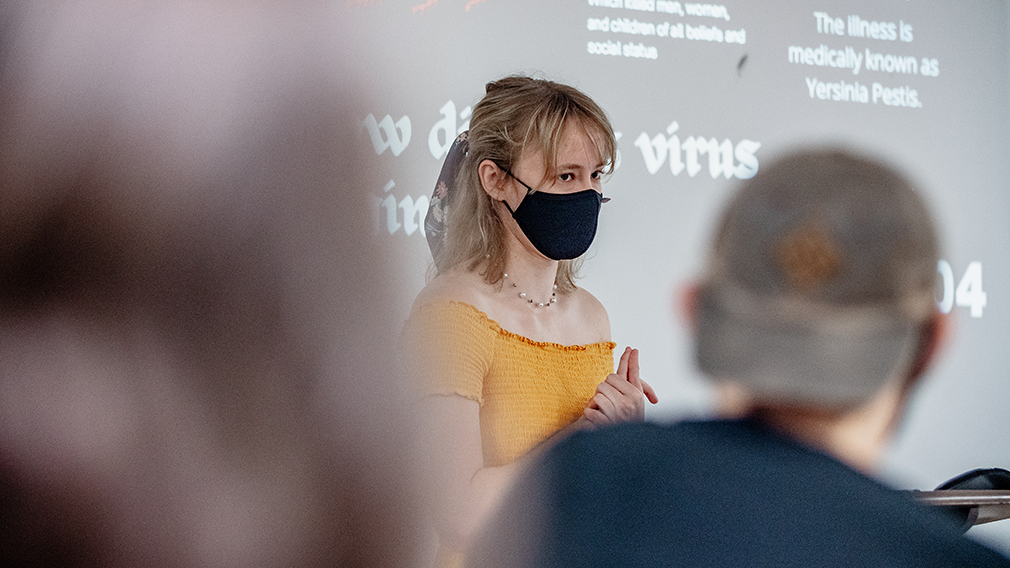Students in the Anderson University College of Arts and Sciences presented research on a variety of topics to their peers, professors and via Zoom to family members April 15.
The presentations covered the academic disciplines of actuarial science, biblical studies, biology, biochemistry, history, mathematics and psychology.
Following a presentation about employing a mathematical model for evaluating natural cancer treatments, Dr. Josiah Reitwig, associate professor of mathematics, reflected on the importance of students having these presentation experiences.
“I think it’s important for each student to apply what they’ve learned in a real-world setting where the equations aren’t necessarily coming from a class but from a real-world situation as we see here where the numbers don’t always work out nicely; you have to work through multiple things,” Reitwig said. “Independent research is important, I think, for anyone, especially mathematicians, so it’s great to be learning beyond the traditional curriculum.”
Claire Grider, a junior history major, was giving a presentation about the medieval environment during the Black Death, exploring relationships between major religious groups and persecution of people of Jewish faith and also giving a historic perspective to the COVID-19 pandemic.
“What I hope for people to get out of this presentation is to remember the past but also don’t repeat it in the future. It seems like a lot of the violence is Asian hate nowadays similar to like it was Jews back then. I’m hoping that my presentation was able to tell people… that there are other ways we can handle the pandemic without being violent and showing hatred to others,” Grider said.
Jacob Weaver, a senior majoring in clinical psychology, sees presentations of this type as a learning tool that will benefit him in the future. He did a presentation on the effects of working out on mood regulation, emotional stability and concentration.
“For me, presenting in front of my peers is a more important aspect of presenting than presenting in front of my professors. I know that my professors are used to reading research articles and watching presentations, but my peers are not as exposed to that side of academia. So, being able to present in front of my peers challenges me to be able to bring the level of quality my professors expect—and more—while also making sure that I am keeping my peers interested and engaged,” Weaver said.
As he observed the student presentations, Dr. Allan Wilford, professor of political science, affirmed the importance of students presenting their research and being able to field questions from an audience.
“It gives a chance to present your work, you get to show your peers and family members (via zoom). It’s a great life skill for these students to learn; they’re going to go to grad school, they’re going to be doing this kind of stuff all the time, presentations at conferences. Doing it in a formalized professional setting is helpful.”
Student Presentations
Biochemistry
Madeline Treaster, Zoe Sanders and Chrissy Anderson; mentor, Dr. Diana Ivankovic – The Effects of Origanum majorana on MCF-7 and MCF-12A Cell Lines
History
Diedre Brown; mentor, Dr. Lynneth Renberg – The Veil in Modern Turkey and Iran
Hunter Curlee; mentor, Dr. Lynneth Renberg – Proclamation as Transformation: An Analysis of Performance and Liturgical Language in the Medieval Era
Claire Grider; mentor, Dr. Lynneth Renberg – A presentation focusing on the medieval environment during the Black Death and the Persecution of the Jewish People at the time
Mathematics
Bereket (Bek) Gebrehawariyat; mentor, Dr. David Prager – Using a Markov Chain Model to Analyze Long-Run Game Trends for AU Football (Soccer)
Stephen Hamadi; mentor, Dr. David Prager – Calculating Correlations Among Economic Growth Measures for Various Countries
Andrew Nesbitt; mentor, Dr. David Prager – Pair Trading: The Usefulness of Pairing a Short Position with a Long Position in Today’s Stock Market
Katlyn Williamson; mentor: Dr. David Prager – Determining the Effectiveness of a Natural Cancer Treatment through Markov Chains
Naomi Woodbury; Mentor, Dr. David Prager – An Analysis of the Usefulness of Distance Formulas and Metric Spaces in Comparing Chord Progressions of Original Compositions
Psychology
Brianna Green; Mentor, Dr. Patty Slaughter – A Curriculum for Practicing Trauma-Informed Drama Therapy for Adolescents
Jacob Weaver; Mentor, Dr. Robert Franklin – Effects of Working Out on Mood Regulation, Emotional Stability, and Concentration

